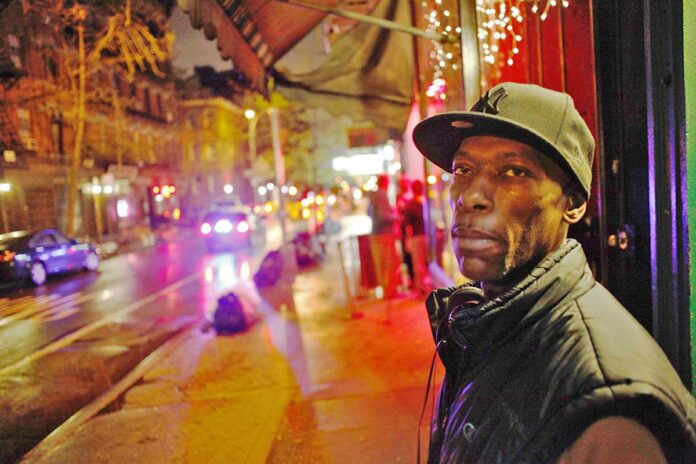One of the highlights of the Black Star Film Festival is writer/director Elegance Bratton’s intimate, affecting, and eye-opening documentary, “Pier Kids,” (August 24, 1:30 pm). The film chronicles life as it is lived on New York City streets by a secret society of homeless queer and trans youth. Krystal, who is transgender, periodically performs sex work to earn money she needs. A scene of her visiting her mother and aunt, who fail to acknowledge her gender identity, is heartbreaking. When DeSean is interviewed, he talks about how he was kicked out of his house when he came out, and later reveals a troubled childhood. Other subjects, like Casper, tell their personal stories to Bratton’s unflinching camera. (Bratton will give 5% of the proceeds when he sells the film to his participants).
“Pier Kids” shows the close-knit community these homeless youths create and the support they have for each other. The film also captures how the pier provides these youths with a safe space, despite repeated encounters with cops. Bratton features ballroom scenes, protests, and even a “twerk fest,” to include some happier moments, but what resonates is the grim statistic that opens the film: half of the 2 million homeless youth identify as LGBTQ, and 40% of them are people of color.
PGN chatted with Bratton, who lived in Philadelphia from 1999-2002, about his documentary in a recent phone interview.
How did you come to tell the story of “Pier Kids” and how did you find the participants and get them to trust you?
This was a film that comes from a deep, spiritual need to understand the meaning of home as a Black queer person and as someone who had experience with homelessness. I was on that pier. It was my playground and living room. When I met Krystal, she said, “If you want to tell my story, you have to be my friend and be on my side if the cops or someone is picking on me. I need someone who will be there with me when things are tough.” It revolutionized the way I made this film. The audience is transported into the skin of oppression and into the head of someone who has nowhere to go. There are no doctors, politicians, or sociologists in the film, only the people who live it.
The participants all grapple with issues of family, money, gender and sexuality, and even health. What are your thoughts about the strength of these youths?
This is a movie that is rooted in the power of choice. I think very often when we see poor Black people on screen, people think that they don’t have a choice. I would rather look at it by reveling in the choices they make — good or bad. It’s the will to continue, endure, and survive. Agency is not defined by the system of capitalism or exploitation. Agency is the opportunity defined by a choice that gives you another choice, and that choice gives you more time to live and find a solution to your problems.
In the canon of documentary films, “Hoop Dreams,” presents the idea that everything is hanging in the balance of one thing. But films like this don’t see the covert white supremacy. These characters’ lives don’t mean anything unless they achieve a form of success that is defined by white, middle class, heterosexual. I’m impressed by Krystal’s choice of family and love when those two things are painful for her. And she is loving and keeps forming family and that gives her the ability to confront her family and move a little bit of progress. It’s turning a camera on the Gay Rights Movement to see what progress is for those not able to get married or buy a home.
Do you want your film to be a call to action for viewers?
I don’t operate in a space of privilege where awareness has been enough. Awareness with action is what is going to help this problem of queer youth homelessness be a thing of the past.
At Stonewall, Marsha P. Johnson and Sylvia Rivera started the riot against police harassment and brutality. We have to learn that the people who have the least to lose have the most to gain when it comes to revolution. The people who look like Marsha and Sylvia are still enduring homelessness after gay marriage and gays in the military. Let’s not get drunk and impressed on HIV medications or gay marriage. Let’s instead think about the fact that 50 years after Stonewall queer youth of color are still at risk.
As a filmmaker, can you talk about the importance of festivals like Black Star, which helped launch your work when it screened your short “Walk for Me” in 2017?
I am one of the biggest fans of Black Star. Maori [Holmes, the festival founder] is a visionary and she has taken so many of us black filmmakers on her back and kept us in her heart and mind. Black Star is about showing diverse, multifaceted black experiences, and it’s not afraid to contradict itself. We are not monolithic. I get to be in conversion with all aspects of the black community. I’m not ostracized or exiled. My first grant came from Black Star. I feel they are at the vanguard.

